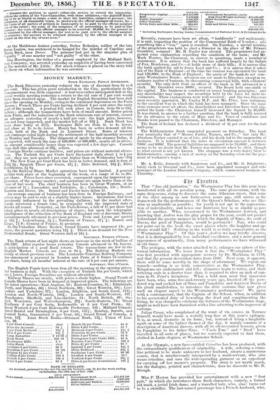tOr gOratrefs.
That "fine old institution" the Westminster Play has this year been manifested with all its peculiar pomp. The same proscenium, with the same drop-scene, rising to discover the same Athenian street, that some of the older among us saw forty-seven years ago, still serves as the framework for the performances of the Queen's Scholars, who are like- wise as unalterable as possible ; for youth is not apt in the representa- tion of individuality, and hence one histrionic boy is as similar as pos- sible to another. Who, accustomed to the Westminster festival, and knowing that Andria was the play proper for the year' could not predict beforehand the precise manner in which the dignity ofSime, the craft of Davus, the grief of Pamphilus, would be portrayed ? Nay, who could not point out in the book the exact places where the laughter and ap- plause would fall ? Nothing in the world is so truly conservative as the "Westminster Play." Of this year's Andria we may briefly observe, that it is clistingaished by less individual excellence, and a more general appearance of spontaneity, than many performances we have witnessed in old times.
The prologue, with the notes attached to it, enlarges our sphere of his- torical information. We learn from it that the "Westminster Play" was first provided with appropriate scenery by Dr. Markham in 1758, and that the present decoration dates from 1809. Next year, it appears, there will be some novelty in the shape of adornment. We repeat our remark—nothing is so truly conservative as the Westminster Play. Kingdoms are undermined and fall ; dynasties begin to totter, and their tottering ends in a shorter time than is required to alter an inch of can- vass in St. Peter's dormitory. What a bold man must that innovator have been, who, some five-and-twenty years ago, knocked off the pow- dered wig and cocked hat of Simo and Pamphilus and deprived Dayus of his plush smallclothes, to introduce the Attic costume that now gives such an elegant aspect to the Westminster performances ! We agree with a contemporary, that the Captain of the School, when in addition to his accustomed duty of bewailing the dead and complimenting the living, he was charged to celebrate the fortunes of the Westminster stage, might as well have been furnished with a line adverting to the improver of costume.
Julius Cresar' who complained of the want of vis cornice in Terence himself, would have made a wofully long face at this year's epilogue. It is, as usual, dramatic in its form ; but, instead of being a laughable squib on some of the lighter themes of the day, it mainly consists of a description of American slavery, with all its oft-recounted horrors, given by Pamphilus to his father Simo. "Uncle Tom" and " Dred" have travelled in all sorts of places, but we scarcely expected to find them, clothed in Latin elegiacs, at Westminster School.
































 Previous page
Previous page